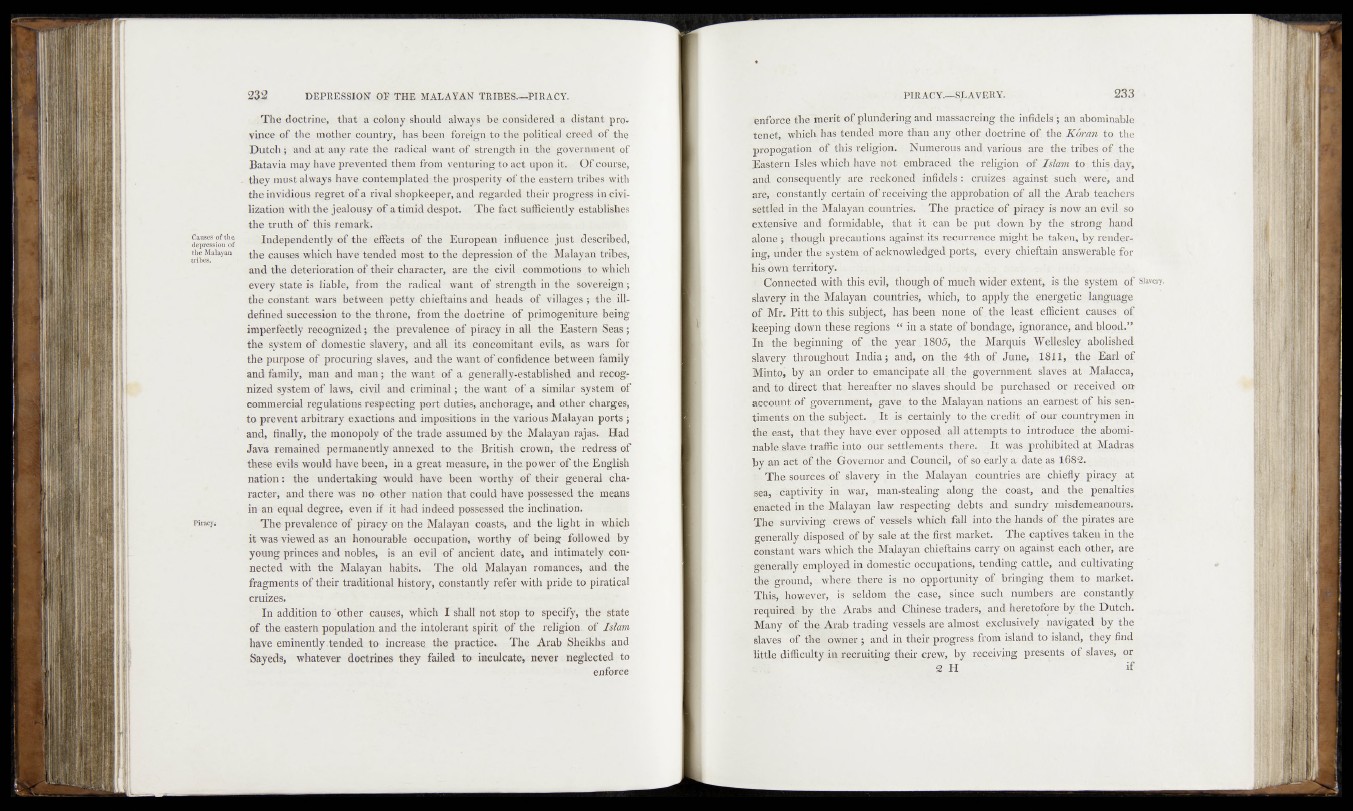
The doctrine, that a colony should always b$ cqnsklef dd, a distant province
of the mother country,'(has-been foreign to the political, ctpedof^fhe
Dutch j 'and at any rate the radical want of strength in ::thc'.gQMer.poaent of
Batavia may have prevented them from venturing Jo act upon ip.-.. Of Course,
- they mrist always have contemplated the prosperity of the eastérntr jbes. with
the invidious regret of a rival shopkeeper, and regarded their progress- in civilisation
with the jealousy of a timid despot. The fact sufficiently establishes
the truth of this remark. .
fames of the Independently of the effects of the European influence just described,
I l S i the eausea which have' tended most to the depression of the Malayan tribes,
and the deterioration of their character, are the eiyil commotions to which
every state -is1 liable,* from the radical want of strength in the sovereign;
the constant wars between;patty, chieftains and heads of villages j the. ill-
defined succession the throne, from the doctrine of primogeniture being
imperfectly recognized $ the prevalence of piracy in all the Eastern Seas j
the system of domestic slavery, and all its" concomitant evils* as wars for
the purpose of procuring slaves, and the wank o f confidence between family
and family, man and man; the want of a generally-established and recogr
nized system of laws, civil and criminal; the want of a similar system of
commercial regulations respecting port duties* anchorage, and'other charges,
to prevent arbitrary exactions and imposteans in the varions Malayan ports j
and, finally, the monopoly of the trade assumed by; the Malayan rajas.. Had
Java remained permanently annexed to the- British cEowO^ttë redress of
these evils would have been, in a great measure, in the power: of the English
nation: the undertaking would have been worthy of their, general cha-
racter, and there "was no other nation th a t conld. have possessed the, means
. in an equal degree, even if it had indeed possessed the InelinMioni.
Piracy« T he prevalence of piracy on the Malayan coasts, and the light in which
it was viewed as an honourable occupation, worthy ©f being followed by
young prinees and nobles, is an evil -of ancient date, and intimately, can*
nected with the Malayan habits. The old Malayan romances, and the
fragments of their traditional history, constantly refer with pride to piratical
cruizes.
In addition to 'other causes, which I shall’ not stop to specify, the state
of the eastern population and the intolerant spirit ipf the religion, o f 'Islam
have eminently .tended to increase the practice* The Arab Sheikhs and
Sayeds, whatever doctrines they failed to inculcate, never neglected to
enforce
Sfenforce the merit of plundering and ^agsaprejqg'tEej infidels';,an abominable
itenetf. whiclf h a s i t e p ^ e d s m o r e , d o c t r i n e o f the Koncm tonthe
■p^opog^tion' of thiSJjr,eligiowi ; .HutMero^s.'and^yhrious a re . the, tribê^ of-‘;the
.pastern'' Iÿ eS '^ ic h , have no'h embraced; thfe-^pjigioft.' of^Islatn, ftossthisyday,
and"consequently are/ reckoned, jpfidels :.;<jg£izest against..sù_eh Jwere, and
kWiSpistantly certamrpffrecerangfthe approbation of all the. Arab teachers
settled in the Malayan dpunftiesi ;jThe>' pragti^o f/p ira cy is nOW^aneyil« so
extensive -andlr be : p.dt d.Owft/Bypthe ,stfong -hand
aloRe ÿrtftough pi ecantiom^agçpn^t its^recurrejnce .taken, b y render^"
ing,1 under the; systgihJ,of acknowledgedçpprft.y every. tÇftigÆ^aftx .answerable for
his.qwh;7territory: ..
ni Connected with, this evrl, .though of. much, wider t extent, system of
slavery in the. Malayan countries, ■vÿhichy toy apply1 -language
ôf-Mr. Pitt fôfthâ®subject, vhas„be„erf{ none o^tftebl&asf efficient .causesi of
keeping down these régions,. “ in-a 'sfatd'Qffeq^ag.er>ignâr^S<?ç?-?Sfisbl9I<3d’”
Inatdfe beginning bf^jthe year*18i&5, -the. Marquis ^ ë lW W j abolished
throughout-Jlndia ; arid, oifeythe. 4ths of Juné^; 18J. 1, the 5Earippf
Mintoi/.by -an. order, fo Emancipate all. the-^government;, slaye^j|t ; Malacca,
and to direct that, hereafter,mo Fayes', should be ^pOrcha^d^pr received on
apepunt-'of. government,^.gave, to .the Malayan nations ; an., eaj'pesb of his sen-;
ftrirents'on the s ^ e jE .^ lIt is certainly .to .the.ân-.edi%i.of louycOTmtryynen in
Ihe^easftfthat.they haV'éy^^ opposed, all atte^p|s^to- jntroduce^ theab,ornjt
liable slaveitraffic/into. our settlements; there,. ItlpwaS^prphibited, at Madras
b,y.am aeftof ithe (.Groverqpp, and Cotoeili ;of^o^ r i y^f dateas,4-68%.>i d
MThe^soutceSyOf .alaveyy, ip. the Malayan^icpujrtrifs j aret chiefly piracy at
sea, - captivity : in. ,war, J man:stealing. alopg^ t^g;,coast, and athe ( penalties
efisSfctgd in the Malayan .law respecting! debts.anct sundry misden^earioursp
The- surviving, "crews,of vessels-,which fall-into the hands o^the pirates-^re
generally- disposed of by spp]at the first market., The captives taken jn;the
constant wars« whicHi^he Majayan chieftains^eariry^n kagainst-ea,cft Other, ' are
generally employed;in domestic occupations tjnding catft.'e,,-and cultivating
the ground, - no. .opportunity , o f bringing, fchenrito market..
This, however, is' seldom fthe . case, Since tsuc^numbers. are, constantly
requited- by stha. Arabs and Chinese traders^ and^heretofore\^tl^ Dutch.
Many of the Arab „trading vessels are almost ^ exclu^ye^^navigated by the
Slaves of me-,owner ;jm d in their progress, ftom island/to ûsland, they find^
little, difficulty in recruiting their .crew, by receiving PS§seJ^Lftf.;?%ve& .ft?
2 H ’ . I . if
Slaver